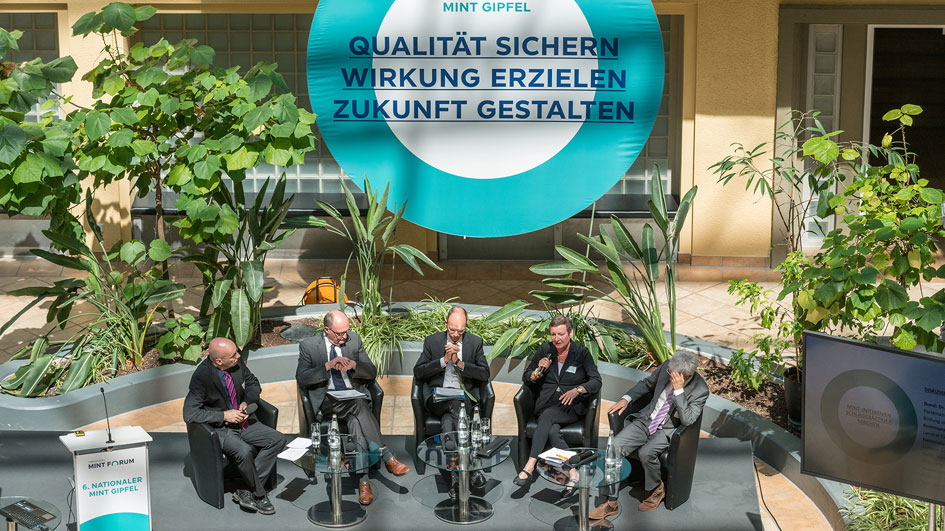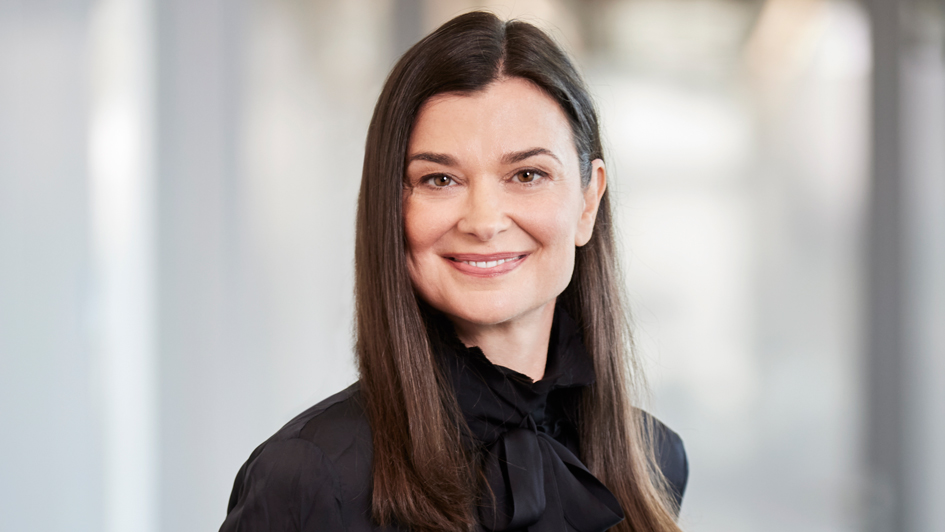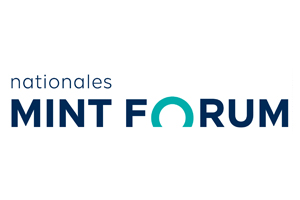National STEM Forum Germany
Working together towards a national STEM strategy in Germany

Germany is home to an impressive number of STEM initiatives in charge of a wide-range of related programs. National STEM Forum Germany (Nationales MINT Forum Deutschland) seeks to generate more public and political awareness for these initiatives and programs by developing recommendations and proposals for addressing specific challenges along the entire STEM education chain. The forum works towards uniting political and civil society stakeholders in a concerted effort for implementing these solution.
Initiative
Nationale voice for STEM stakeholders
The National STEM Forum Germany is comprised of over 33 large, nationally-active scientific institutions, foundations, and associations working collaboratively for improved education along the entire education chain in the fields of Science, Technology, Engineering and Mathematics (STEM, in German: MINT). This encompasses education at all levels: early childhood, scholastic, professional, academic, and continuing or life-long learning efforts. The primary goal of the National STEM Forum Germany is crafting joint positions and recommendations for education policy based on the perspectives, interests, and specific issues represented by its members. As the national voice of STEM stakeholders in Germany, the forum consolidates the experiences and expertise of STEM civil society into a common position. This collective voice gives the forum a platform for initiating public debate and for engaging in constructive dialog with other stakeholders, particularly those from the political realm.
The National STEM Forum Germany was founded in 2012 by acatech – Deutsche Akademie der Technikwissenschaften (National Academy of Science and Engineering) and as part of an initiative from the Confederation of German Employers’ Associations (BDA) and the Federation of German Industries (BDI) called MINT Zukunft schaffen (Creating a future for STEM). The forum encourages collaborative efforts in addition to the individual initiatives of each member. Working groups shape education policy recommendations, common standards of quality, or collaborative projects pertaining to STEM education.
National STEM Summit: Dialog in politics and civil society
The forum’s activity takes center stage at the annual National STEM Summit, which focuses on a different aspect of STEM education each year based on the National STEM Forum Germany’s core objectives. Members of the forum join top political and administrative representatives in discussing this issue and working out potential means for implementing new approaches.
Our role
Systematically linking STEM options
We believe the only way for Germany to advance in the various aspects of STEM education is with comprehensive and long-lasting support and collaboration among the country’s relevant STEM stakeholders. As such, we’ve been an active member of Nationales MINT Forum since its inception in 2012. Dr. Nathalie von Siemens, who served as Siemens Stiftung Managing Director from 2012-2020, was also co-spokesperson of the Nationales MINT Forum (National STEM Forum, Germany) from 2015-2020.
Engagement in working groups
We are also involved in two Nationales MINT Forum working groups: “STEM – staffing at schools” and “Quality and impact.” Dr. Barbara Filtzinger, head of Siemens Stiftung’s Education working area, also runs the forum’s working group on “Holistic concept of education.” Policy papers with findings from these and other working groups are available on the Nationales MINT Forum website.
STEM quality campaign
As part of Nationales MINT Forum, Siemens Stiftung is also participating in a STEM quality campaign that seeks to permanently improve the quality development of extracurricular STEM initiatives in Germany.

»All aspects of our lives are affected by technology. STEM education is therefore a crucial part of taking part in society.«
Dr. Nina Schmidt, Managing Director Siemens Stiftung
Partners
For collective progrss – members of the National STEM Forum Germany
acatech – Deutsche Akademie der Technikwissenschaften e.V., Leibniz Gemeinschaft, Bundesagentur für Arbeit, Deutsche Telekom Stiftung, Deutsche Industrie- und Handelskammer, Dieter Schwarz Stiftung, Fraunhofer-Gesellschaft, HAWtech – HochschulAllianz für Angewandte Wissenschaften, Heinz Nixdorf Stiftung, GESAMTMETALL – Gesamtverband der Arbeitgeberverbände der Metall- und Elektroindustrie e.V., Helmholtz-Gemeinschaft Deutscher Forschungszentren e.V., HRK Hochschulrektorenkonferenz, Körbe-Stiftung, Kompetenzzentrum Technik-Diversity-Chancengleichheit e.V., Science on Stage Deutschland e.V., MINT-EC, Berlin-Brandenburgische Akademie der Wissenschaften, BDA | Bundesvereinigung der Deutschen Arbeitgeberverbände, MNU – Deuscther Verein zur Förderung des mathematischen und naturwissenschaftlichen Unterrichts e.V., TU9 German Universities of Technology e.V., matrix gGmbH, 4ING – Dachverein der Fakultätentage der Ingeneurwissenschaften und der Informatik an Universitäten, Wissensfabrik – Unternehmen für Deutschland e.V., Vector Stiftung, Wilhelm und Else Heaeus-Stiftung, VDi – Verein Deutscher Ingenieure e.V., TÜV Rheinland Stiftung, MINT Zukunft schaffen, Stiftung Jugend forscht e.V, Stiftung Kinder forschen, Stifterverband für die Deutsche Wissenschaft e.V., Siemens Stiftung, sdw – Stiftung der Deutschen Wirtschaft gGmbH, Nationale Akademie der Wissenschaften Leopoldina
Contact
Project manager
Dr. Barbara Filtzinger
barbara.filtzinger@siemens-stiftung.org
+49 89 540487 0
+49 30 94 86 83 78



